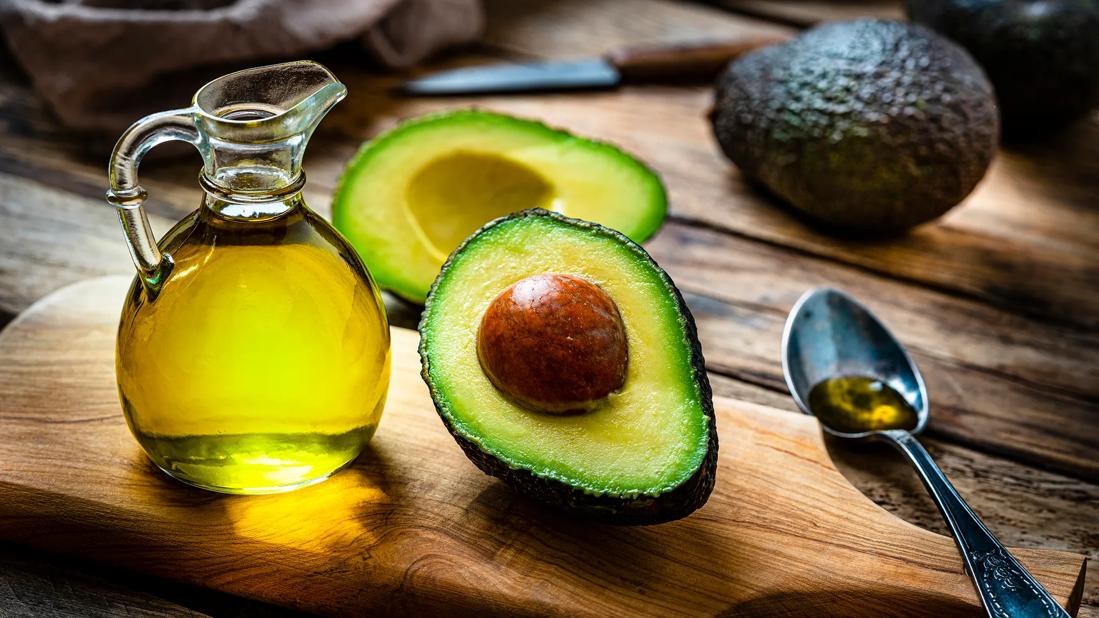This healthy oil is packed with nutrients and great for roasting, drizzling and even baking

Image content: This image is available to view online.
View image online (https://assets.clevelandclinic.org/transform/2f840234-9527-4ba6-83d8-309dcdf56a85/avocado-oil-1303865508)
Half an avocado with the pit inside sits next to a glass pitcher of avocado oil and a spoon with some oil on it
Avocados are everywhere: on your toast and in your smoothies, sandwiches and salads. To get even more avocado in your life, try its trendy cousin, avocado oil.
Advertisement
Cleveland Clinic is a non-profit academic medical center. Advertising on our site helps support our mission. We do not endorse non-Cleveland Clinic products or services. Policy
Registered dietitian Julia Zumpano, RD, LD, offers some expert advice on why you should give avocado oil a try and how to use it in the kitchen.
Avocado oil, just like avocados, is a good source of several key nutrients, Zumpano says. Its nutritional content is similar to olive oil, which is often regarded as the healthiest oil.
“Nutritionally, avocado oil is one of the best oils for you,” states Zumpano. “It also has unique properties that make it an excellent choice for cooking.”
Avocado oil isn’t a seed oil. It’s made from the creamy green flesh of the avocado fruit. Why is that important?
“Seed oils are made from the seeds of plants, such as corn, sunflowers and peanuts, and are highly processed,” Zumpano explains. “They have little nutritional value and high levels of omega-6 fatty acids — a type of unsaturated fat. Having too many omega-6s in your diet can cause inflammation in your body.”
But avocado oil doesn’t fall into this category.
Avocado oil has a healthy balance of fats. One tablespoon contains:
The nutrients in avocado oil have some potential health benefits:
Monounsaturated fats are good fats that can improve your health.
Advertisement
“That’s why the American Heart Association recommends replacing foods high in saturated fats with those containing monounsaturated fats whenever possible,” Zumpano maintains. “Around 70% of the total fat in avocado oil is monounsaturated, so it hits the mark.”
One important type of monounsaturated fat in avocado oil is oleic acid — which is thought to lower blood pressure. In fact, an animal study found that avocado oil lowers blood pressure as much as a common blood pressure medication.
Monounsaturated fats have other health benefits, too. They reduce bad cholesterol (LDL) and help control blood sugar, lowering your risk of heart disease and diabetes.
Avocado oil has important antioxidants, which counteract free radicals in your body to protect you from disease. Vitamin E is one of the main antioxidants in avocado oil, Zumpano says.
Skin products often contain vitamin E to moisturize your skin and protect it against sun damage. Consuming vitamin E can also improve skin health from the inside out.
Other potential benefits of vitamin E include:
Avocado oil has other compounds with antioxidant properties, including:
Avocado oil is a wonderful, healthy substitute for butter and seed oils.
“It has a milder taste than olive oil and is a little buttery or nutty,” Zumpano notes. “Depending on your preferences, you can use it in any hot or cold food preparation. It also works well in baked goods such as healthier chocolate chip cookies.”
The most distinctive quality of avocado oil, compared with olive oil, is its high smoke point. This means you can use it at higher temperatures before it burns. Try it next time you’re cooking with high heat, such as roasting, grilling or pan-frying.
For the most health benefits, look for unrefined, cold-pressed avocado oil. Although avocado oil is very heat stable, processing may affect the levels of protective antioxidants.
Overall, avocado oil is healthy — but it’s still a calorie-rich oil. Eating too much avocado or avocado oil can put you over your recommended calorie intake. Like any food, it’s best in moderation.
So, is it OK to have avocado oil every day? Zumpano says yes.
“Fats play an essential role in health, and they’re not something to fear,” Zumpano clarifies. “As we’ve seen with the Mediterranean diet, a significant percentage of daily calories can come from fat without negative effects. That’s true as long as you choose healthy fats, like avocado oil.”
Advertisement
Advertisement

Sign up for our Health Essentials emails for expert guidance on nutrition, fitness, sleep, skin care and more.
Learn more about our editorial process.
Advertisement
Olive oil is high in heart-friendly unsaturated fats
Your body needs some saturated fat, but too much can contribute to health issues
It’s best to avoid regular use of the ‘beef drippings,’ given high levels of saturated fat
These common cooking oils are often found in ultra-processed foods and can contribute to inflammation in your body
The popular cooking method can help you cut down on fat without losing the flavor and texture of your favorite foods
EVOO is full of antioxidants and has anti-inflammatory properties, both of which aid your body in multiple ways
The oil some TikTokkers swear by can actually cause stomach and eye issues, as well as skin rashes
This powerhouse oil fights fine lines and wrinkles, soothes sunburn and a whole lot more
Prioritize your health by managing stress, strengthening your social connections and getting quality sleep
Bolsters, blankets, pillows and blocks can offer extra support, stability and comfort
Allergies, postnasal drip, asthma or reflux could be to blame for a cough that won’t quit